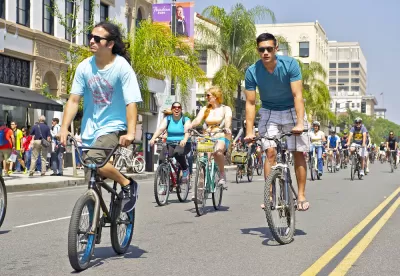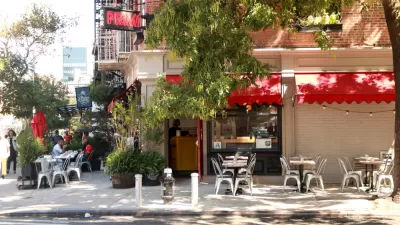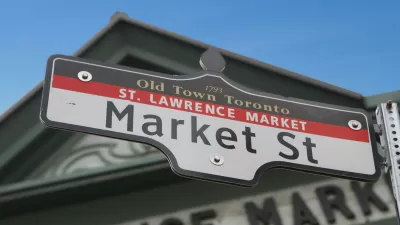CicLAvia is working with the city to make its "al fresco dining" program permanent.

Long before the pandemic made outdoor dining a necessity and "slow streets" a widespread concept, residents of Los Angeles had the opportunity to experience their city without cars through a series of events called CicLAvia. Inspired by Bogota's Ciclovia program, the L.A. version "created pop-up events in L.A. for people to walk, bike, or skate through the city on closed roads." Olivia Richard, writing in LAist, reports on how the nonprofit is using its experience to help restaurateurs make outdoor dining permanent.
"[T]he organization is teaming up with the city of L.A. to help make permanent the al fresco dining program that was launched during the pandemic" and "has been steadily working to assist restaurant owners who are shifting to outdoor dining, but don’t have experience in utilizing outdoor space for that purpose." Despite concerns on the part of restaurant owners about the cost and labor required to implement outdoor dining, says Rachel Burke, director of production for CicLAvia, "It's pretty easy to take this space and use it for something other than cars."
Despite concerns about reduced parking, restaurants on "slow streets" have experienced economic benefits during the past year. As pandemic restrictions wind down, cities will have to decide whether to keep their outdoor dining and slow streets programs in place.
FULL STORY: CicLAvia Helping Expand Al Fresco Dining In Neighborhoods Hit Hard By COVID-19

Planetizen Federal Action Tracker
A weekly monitor of how Trump’s orders and actions are impacting planners and planning in America.

Maui's Vacation Rental Debate Turns Ugly
Verbal attacks, misinformation campaigns and fistfights plague a high-stakes debate to convert thousands of vacation rentals into long-term housing.

San Francisco Suspends Traffic Calming Amidst Record Deaths
Citing “a challenging fiscal landscape,” the city will cease the program on the heels of 42 traffic deaths, including 24 pedestrians.

Amtrak Rolls Out New Orleans to Alabama “Mardi Gras” Train
The new service will operate morning and evening departures between Mobile and New Orleans.

The Subversive Car-Free Guide to Trump's Great American Road Trip
Car-free ways to access Chicagoland’s best tourist attractions.

San Antonio and Austin are Fusing Into one Massive Megaregion
The region spanning the two central Texas cities is growing fast, posing challenges for local infrastructure and water supplies.
Urban Design for Planners 1: Software Tools
This six-course series explores essential urban design concepts using open source software and equips planners with the tools they need to participate fully in the urban design process.
Planning for Universal Design
Learn the tools for implementing Universal Design in planning regulations.
Heyer Gruel & Associates PA
JM Goldson LLC
Custer County Colorado
City of Camden Redevelopment Agency
City of Astoria
Transportation Research & Education Center (TREC) at Portland State University
Jefferson Parish Government
Camden Redevelopment Agency
City of Claremont





























